
- Home
- India
- World
- Premium
- THE FEDERAL SPECIAL
- Analysis
- States
- Perspective
- Videos
- Sports
- Education
- Entertainment
- Elections
- Features
- Health
- Business
- Series
- In memoriam: Sheikh Mujibur Rahman
- Bishnoi's Men
- NEET TANGLE
- Economy Series
- Earth Day
- Kashmir’s Frozen Turbulence
- India@75
- The legend of Ramjanmabhoomi
- Liberalisation@30
- How to tame a dragon
- Celebrating biodiversity
- Farm Matters
- 50 days of solitude
- Bringing Migrants Home
- Budget 2020
- Jharkhand Votes
- The Federal Investigates
- The Federal Impact
- Vanishing Sand
- Gandhi @ 150
- Andhra Today
- Field report
- Operation Gulmarg
- Pandemic @1 Mn in India
- The Federal Year-End
- The Zero Year
- Science
- Brand studio
- Newsletter
- Elections 2024
- Events
How a Guwahati 'chef' fast-tracked Northeast India's street food

On a cold December afternoon, as a stream of diners enjoyed their chicken chowmein served on stainless steel plates, Shiv Narayan Chandra Bora was busy chopping vegetables on a wooden board. Bora, owner of the popular food joint, Reboti Chat House, in Assam’s Guwahati, thinly chopped a whole cabbage, then a few carrots, followed by beans and green onions. Then he mixed all the sliced...
On a cold December afternoon, as a stream of diners enjoyed their chicken chowmein served on stainless steel plates, Shiv Narayan Chandra Bora was busy chopping vegetables on a wooden board. Bora, owner of the popular food joint, Reboti Chat House, in Assam’s Guwahati, thinly chopped a whole cabbage, then a few carrots, followed by beans and green onions. Then he mixed all the sliced vegetables that went into the huge carbon steel wok rustling up more chow mein, as every patron visiting the eatery wants to sample the most popular dish on the menu in its various avatars.
The whole place was bustling with people, talking and laughing. The waiters were rushing to serve the guests and the hissing gas stove cried a loud noise every time the cook threw sturdy noodle threads or eggs into the frying pan greased with oil.
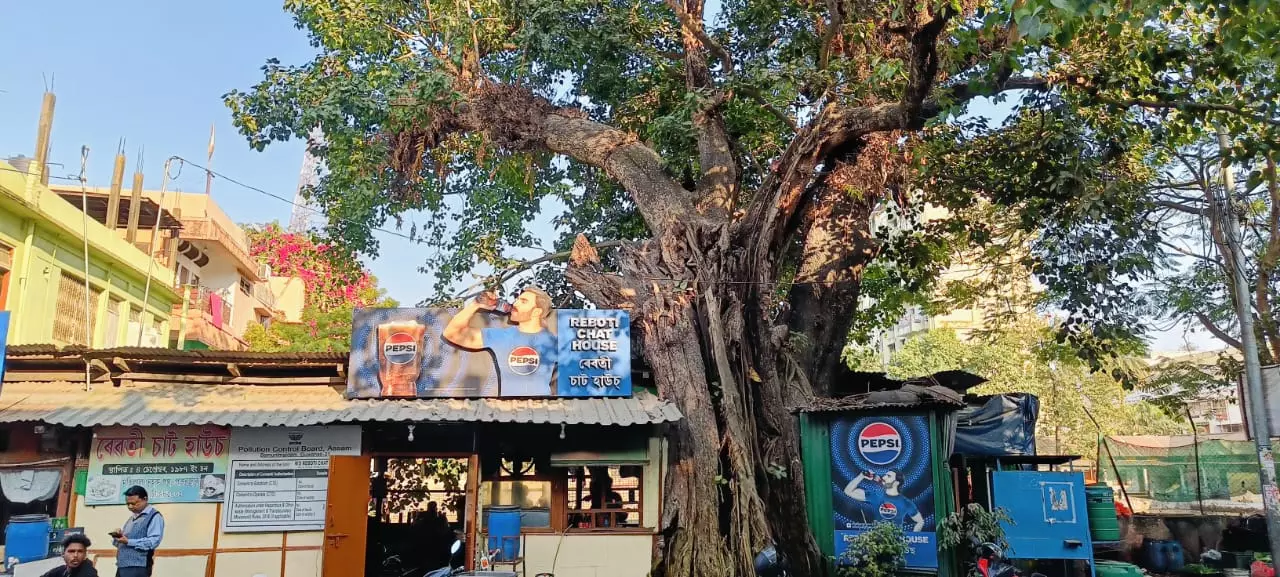
Over the years, Reboti Chat House has become an iconic landmark of Guwahati.
"We serve 12 versions of chowmein. Most guests like their chowmein with chicken, others with vegetables and some with eggs. We do it all for them. Chowmein is our signature dish. It's chowmein that makes our fast food joint popular. The other fast food dishes we prepare are rolls and fried rice," Bora told The Federal.
The past and present of food
Bora emphasised the term ‘fast food’ by which he meant the Indian version of Chinese delicacies. The 64-year-old claimed that he was the first person, a self-taught chef, who “changed the street food scenario of the entire Northeast region by introducing pocket-friendly Chinese dishes for all back in the late 1980s”.
Almost four decades ago, Guwahati, the biggest city in the region, did not have a thriving restaurant culture.
"In earlier times, people preferred to enjoy meals at home with their families. Once in a while, we visited 'hotels' that served tea, sweets and savouries. Even people with money did not eat outside," said Hira Talukdar, a Guwahati-based retired teacher. The septuagenarian added the city hardly had restaurants or street food stalls earlier.
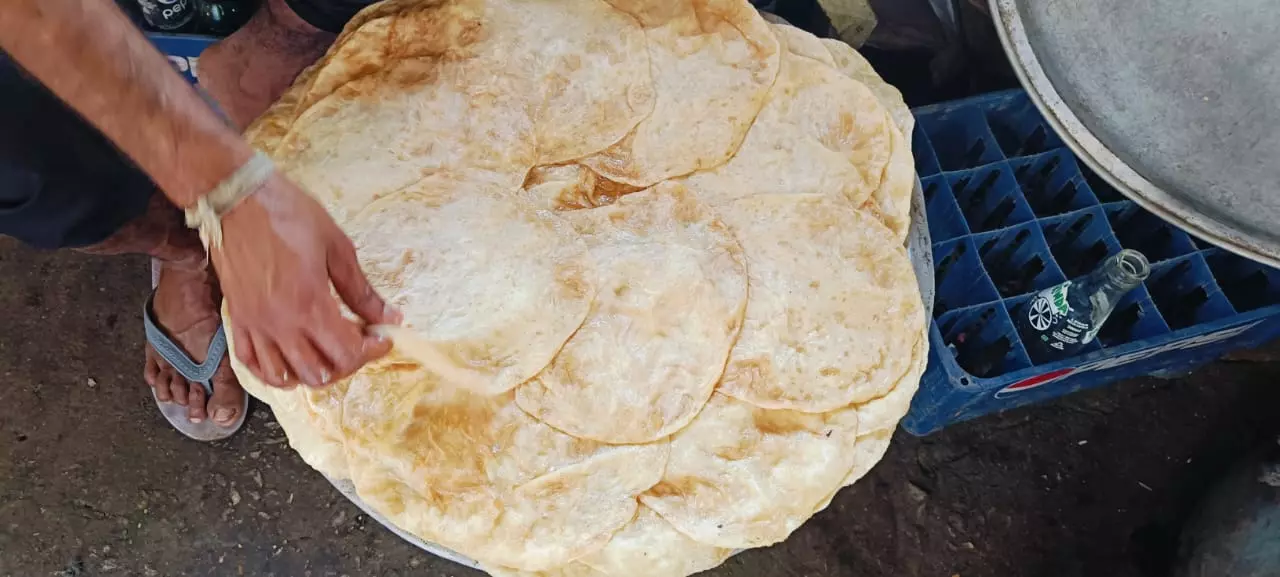
The puris of Reboti.
"Today, we have at least one eating joint in every street of Guwahati."
In the past, people like daily wage earners and office workers ate their staple, bhaat, dali auru machor aanja (rice, dal and fish curry), in small ‘hotels’ mostly nestled on footpaths.
A cart, a tree and a pond
Bora opened Reboti Chat House in Panbazar in 1987. It was a thela (cart) where he started preparing his ‘fast food’ stationed in front of Naak Kata Pukhuri (one of the oldest ponds of the city) and a big aahat gos (peepal tree) providing the much-needed shade for patrons. In a few years, the cart became a popular hangout place for youngsters as they tried their first bite of Chinese food with their friends.
“Over 37 years later, nothing much has changed about Reboti Chat House,” said Bora. “We always serve food with great passion and love. The prices are affordable. That is why college students love our food. They are our primary customers,” he added, waving at a guest who had entered his eatery.
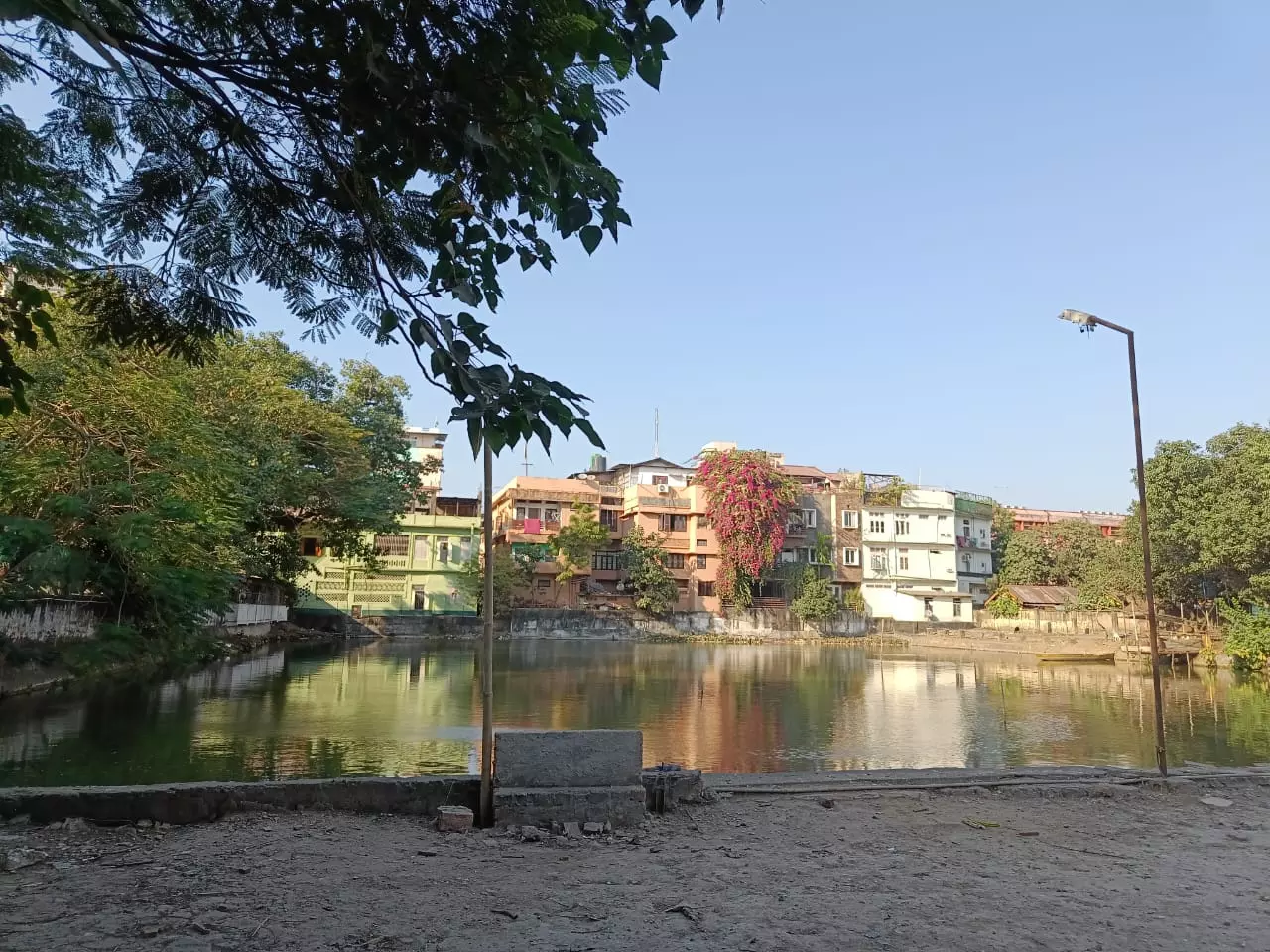
The eatery stands in front of Naak Kata Pukhuri, one of the oldest ponds in the city.
Bora is partly right. Over the years, things have not changed much but at the same time, many things have changed. Panbazar remains the hub of young people, as colleges, schools and bookshops dot the locality. But the area has lost its past glory because of “so-called development and commercialization”, lament old-timers.
Reboti Chat House no longer operates from the cart, instead it is housed in a room made of roofing sheets and wooden planks. The room serves as an open kitchen and a dining hall overlooking the Naak Kata Pukhuri. A part of the peepal tree finds space inside the room as its branches laden with green leaves spread across the eatery's roof. "The tree has been my friend for decades. It has witnessed the highs and lows of my life. I will never let it get chopped," smiled Bora.
Divided opinions and memory down the lane
Foodies have mixed opinions about the place. Some say it is unhygienic and the food tastes average. Others who eat regularly, swear by the chunky meat pieces served with chow mein at an affordable rate. Many old-timers from Guwahati, who have shifted their base to other cities and foreign shores, revisit Reboti for nostalgia.
Bora also has a lot of memories and struggles associated with his business venture which he started to get out of poverty. "I came to Guwahati as a teenager after my father, a farmer, lost all his agricultural land due to floods. My father had to sell our home too. We had become homeless in our village, Ek Number Jola Gaon, in Nagaon district. In 1975, I came to Guwahati with Rs 9 in my pocket. I did a lot of odd jobs, including working as a domestic helper.
“Then after a few years, I started working as a truck loader for Candid Drug Distributors — a pharmaceutical company. I was paid Rs 50 a month in 1978. The money was very little and I could not send anything back home. I wanted to earn more and do something meaningful. My boss, Gautam Banerjee (now deceased), the then owner of Candid Drug Distributors, had given me a space to sleep at night in Piccadilly restaurant (around 50 metres from Reboti and opened in 1978) owned by his family. It's a Chinese restaurant and I learnt to chop vegetables, prepare noodles, rotis, potato chops and fried rice there. That is how I learnt cooking,” recalled Bora.
Bora felt he too could sell ‘fast food’ on the streets. He took the help of a carpenter and built his cart. He loaned Rs 150 from medical representatives of Candid Drug Distributors and bought groceries and vegetables. "I named the place Reboti after my mother. She was dear to me. Regarding calling it Reboti Chat House, I was inspired by a food cart, Popular Chat House, in Paltan Bazar (around a kilometre from Panbazar), selling meals."
On the day Reboti started its journey, Bora was ecstatic. "I don't remember the exact date but it was in August 1987, when I opened the eatery. I sold potato tikkis and ghugni on the day and earned Rs 75. I was happy. From the beginning, I got a good response from foodies. I started selling Chinese dishes soon.
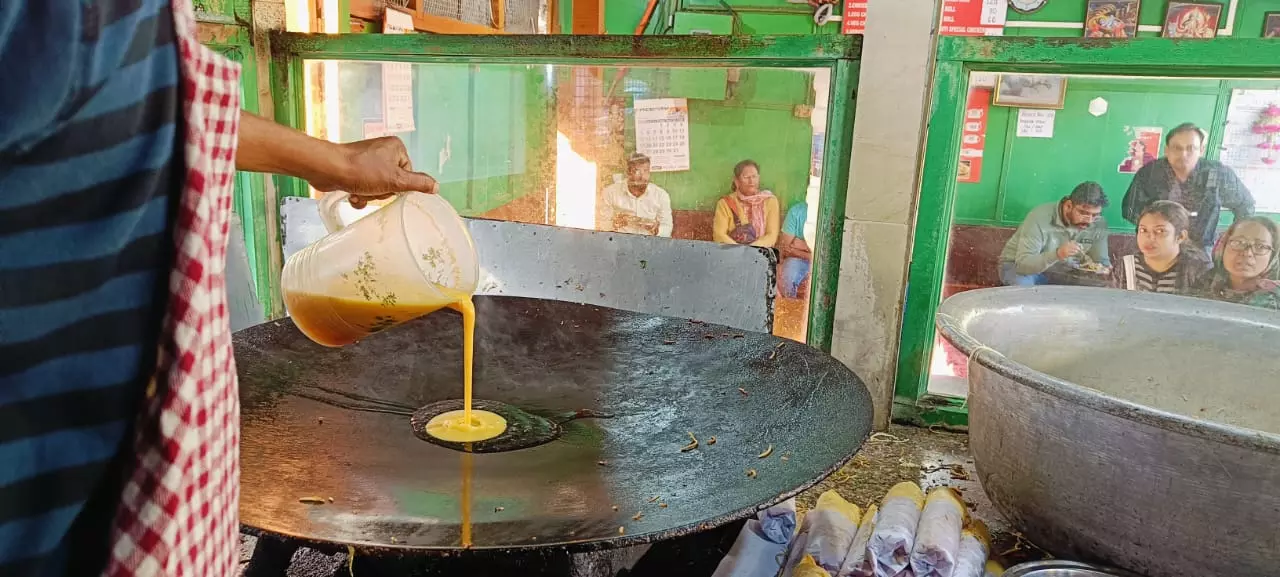
As eggs get fried on the wok, guests can see their food being cooked in the open kitchen.
"But as I had no prior experience, food went to waste and I lost a lot of money. I incurred a debt of Rs 8,000 in three years. I did not know what to do. I had two options, close the place or restart again. I decided to give myself another chance and took a loan of Rs 5,000 from Banerjee Sir, who always helped me. After that I never looked back," said Bora.
Celebrating the ‘celeb’ patrons
In 1994, Bora managed to get a moving license to run his eatery. As his cart operated from Naak Kata Pukhuri, the municipal corporation confiscated his cart. Then he ran into trouble with the district commissioner's office because of licencing. Thereafter, he obtained licenses for trade, food, pollution and garbage. "When my cart was confiscated, Assam chief minister Himanta Biswa Sarma, then a student leader, helped me get back my cart from the authorities. He used to eat here regularly with his friends," Bora smiled.
Sanu (who writes only his first name), one of the 22 people who work with Bora at Reboti, said, "From chief ministers to cab drivers, everyone has eaten food here." "I have been working here for 25 years and I have seen so many celebrities, including singer Zubeen Garg, coming and eating food here."
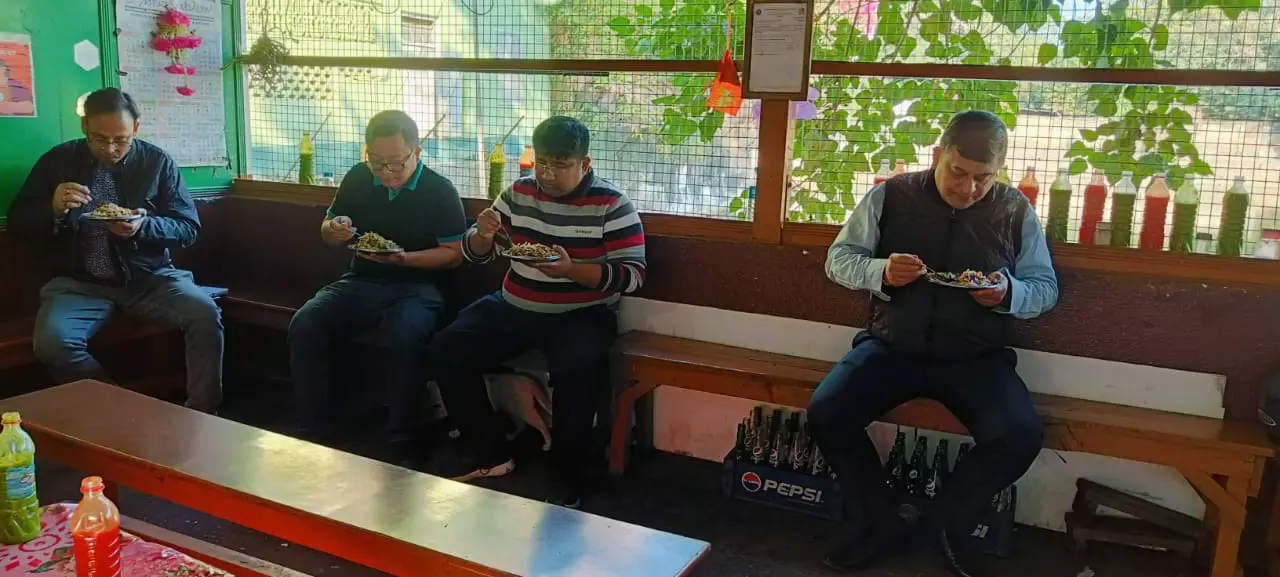
Diners enjoying their chow mein at Reboti.
Sanu's co-worker, Hemanta (who writes only his first name) added, "In the last few years, many new restaurants have opened in Guwahati. But no eatery can compete with the iconic Reboti."
Montu Sharma, who eats regularly at the eatery, agreed with Hemanta. "The food, the stories and the memories truly make Reboti an iconic place."
